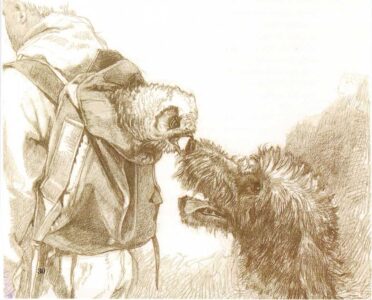Stories
I Find Wol
from Owls in the Family by Farley Mowat
Billy, Bruce, and Murray have lots of pets—dogs, white rats, snakes,
rabbits, and gophers. Then they find the nest of a great horned owl.
There are three young owls in the nest. Of course, the boys think the
little owls would make great pets. But how are they to get the owlets
out of the nest?
The next week seemed awfully long. The only time I really hated school
was during the springtime— particularly in May when the birds were
busy nesting on the prairies. This May week, what with thinking about
the owls, and sitting by the open window sniffing the smells of
springtime, I wished school had never been invented.
Every recess, and after school, Murray and Bruce and I talked about the
young owls and tried to think of ways to get them out of their nest.
Murray
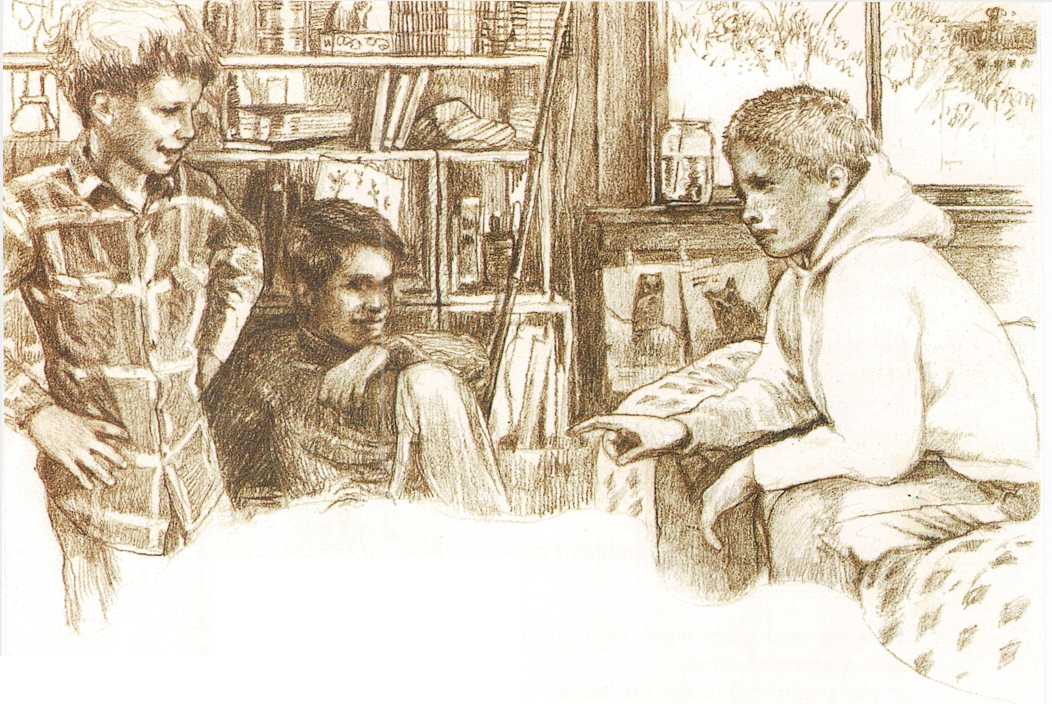
suggested we should cut down the tree; but that was too dangerous
because the young owls might be hurt. Bruce said he might get his father
to come and shoot the old owl so it would be safe for us to climb the
tree; but that wasn’t fair.
The only thing I could think of was firecrackers. My idea was to get
some small skyrockets and let them off under the nest to scare the
mother owl away. The trouble was that we had no money and, anyway, the
storekeepers wouldn’t sell skyrockets to kids our age.
Then, on Friday night, we had a storm of the kind called a “chinook.”
Chinooks come down out of the Rocky Mountains in Alberta and sometimes
they blow right across Saskatchewan—and they blow like fury. Lying in
my bed on Friday night I could hear branches snapping off the poplar
trees along the riverbank. The rain was pelting on the roof so hard that
it scared Mutt (who always slept on my bed) and made him howl. I had to
pull a quilt over his head to make him keep quiet. He hated storms. I
worried about the young owls for a long time before I finally fell
asleep.
Early on Saturday morning Murray called for me and we met Bruce at the
Railroad Bridge. It was a fine morning and the sun kept popping in and
out between the white clouds that were racing across the sky trying to
catch up to the chinook. Everything was steaming from all the rain, and
the prairie was soggy wet.
We hurried across the fields and didn’t care if our feet did get soaked,
because we were worried about the owls. When we were still quite a way
from Owl Bluff, Bruce gave a shout:
“Lookee!” he yelled.
Sure enough, six or seven of the biggest cottonwoods were snapped right
off at the tops. But the worst thing was the owl’s-nest. The rain and
wind had smashed it to pieces, and all that was left was a stick or two
stuck in the crotch where the nest had been.
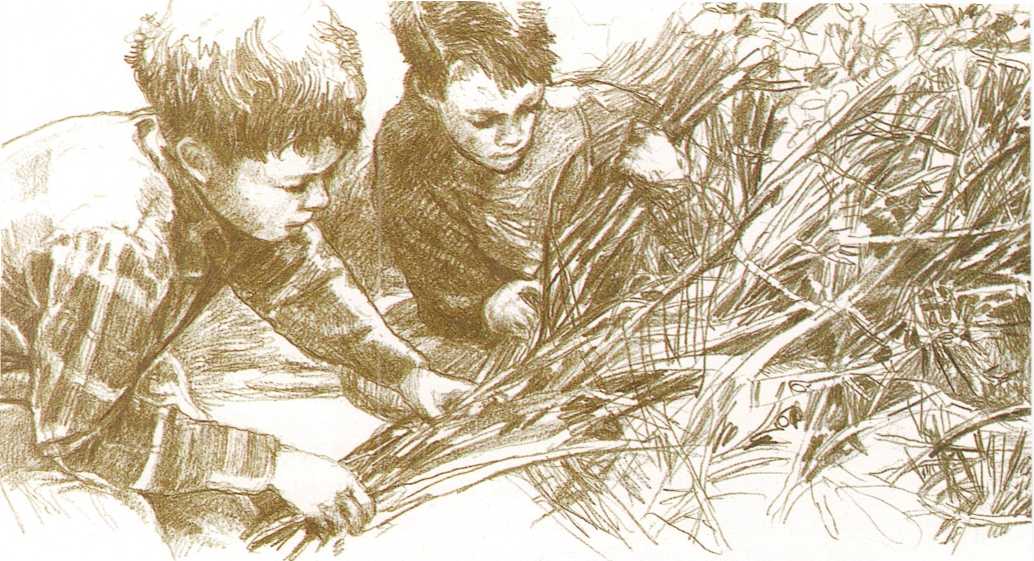
There was no sign of the old owls at all; but on the ground near the
foot of the tree were two young owls—and they were cold and dead. They
were so young they had grown only about half their feathers, and
baby-down was still sticking to them all over. I don’t know whether they
were killed by the fall, or not; but they were as wet as sponges and I
think they probably died from being so wet and cold all night long.
We felt as miserable as could be, and all we could think of to do was to
have a funeral for the little owls. Bruce had his jackknife with him and
he started to dig a grave while Murray and I went looking for the kind
of sticks to use for crosses. There was a big pile of brush nearby, and
I happened to give it a kick in passing. Something went snap-snap-snap
from under it. I shoved my hand under the brush and touched a bundle of
wet feathers.
Bruce and Murray came over and we pulled the brush away. There was the
missing owlet, the third one that had been in the nest, and he was still
alive.
He was bigger than the other two, and that was

probably because he was the first one hatched. Horned owls are funny
that way. They begin to lay their eggs in March when it’s still winter
on the prairie. The eggs are laid a few days apart, but from the time
the first one is laid, the mother has to start “setting.” If she waited
until she had a full clutch of eggs, the early ones would be chilled and
would never hatch. The first egg that’s laid hatches first, and that
young owl gets a four- or five-day head start on the next one who, in
turn, gets a head start on the next one.
The one we found must have been the first to hatch because he not only
was bigger than the others but must have been a lot stronger too. When
the nest blew apart, and he fell to the ground, he was able to wiggle
under the brush pile for shelter, and that probably saved his life.
He was about as big as a chicken, and you could see his grown-up
feathers pushing through the baby-down. He even had the beginnings of
the two “horn” feathers growing on his head. A surprising thing about
him was that he was almost pure white, with only small black markings on
the ends of his feathers. When we found him he looked completely
miserable, because all his down and feathers were stuck together in
clumps, and he was shivering like a leaf.
I thought he would be too miserable to feel like fighting, but when I
tried to pick him up he hunched forward, spread his wings, and hissed at
me. It was a good try, but he was too weak to keep it up, and he fell
right over on his face.
I was still a little bit afraid of him, because his claws were long and
sharp, and his beak—which he kept snapping—seemed big enough to bite
off my finger. But he did look so wet and sad that after a while I
stopped being afraid. I got down on my knees in front of him and, very
slowly, put my hand on his back. He hunched down as if he thought I was
going to hurt him, but when I didn’t hurt, he stopped hissing and lay
still. He felt as cold as ice. I took off my shirt and put it over him,
and then I picked him up as carefully as I could and carried him out of
the bluff so he could sit in the sunshine and get dry and warm again.
It was surprising how fast he started to get better. In half an hour his
feathers were dry and he was standing up and looking around him. Murray
had brought along some roast-beef sandwiches for lunch. He took some
meat out of the sandwiches and held it out to the owl. The owl looked at
him a minute, with its head on one side, then it gave a funny little hop
and came close enough to snatch the meat out of Murray’s fingers. It
gave a couple of gulps, blinked its eyes once, and the meat was gone.
He was certainly a hungry owl! He ate all the meat we had, and most of
the bread as well. When I found some dead mice that his mother must have
left on the edge of the nest, and which had also been blown to the
ground, the owl ate them too. They must have been
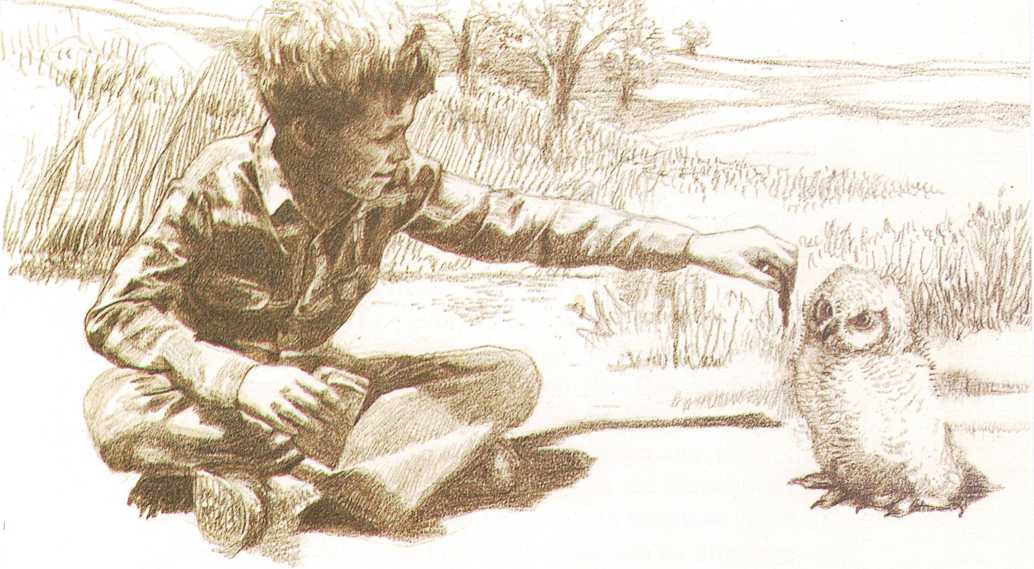
hard to swallow, because he ate them whole. But he got them down
somehow.
After that we were friends. When Bruce and I started to walk away from
him, just to see what he would do, the owl followed right along behind
us like a dog. He couldn’t fly, of course; and he couldn’t walk any too
well either. He kind of jumped along, but he stayed right with us all
the same. I think he knew he was an orphan, and that if he stayed with
us we’d look after him.
When I sat down again, he came up beside me and, after taking a sideways
look into my face, he hopped up on my leg. I was afraid his claws would
go right through my skin, but they didn’t hurt at all. He was being very
careful.
“Guess he’s your owl, all right,” Bruce said, and I could see he was a
little jealous.
“No, sir, Bruce,” I replied. “He can live at my place, but he’s going to
be our owl—all three of us.”
We left him sitting in the sun by the haversacks and then we buried the
other two little owls and had a funeral over them. After that we were
ready to go home.
We decided the best way to carry our new pet was to put him in my
haversack. He didn’t like it much, but after a struggle we managed to
stuff him into it. We left his head sticking out so he could see where
he was going.
Mutt and Bruce’s dog, Rex, hadn’t been with us that morning. I think the
two of them had gone off cat-hunting before we got up. But as we were
walking along the sidewalk in front of my house, we met old Mutt coming
back from wherever he had been.
Mutt was cross-eyed and short-sighted, and so he never could see any too
well. He came up to me to say hello, wagging his long tail and sniffing
me—and then suddenly he smelled owl. I don’t think he knew exactly
what it was he smelled, because he had never been
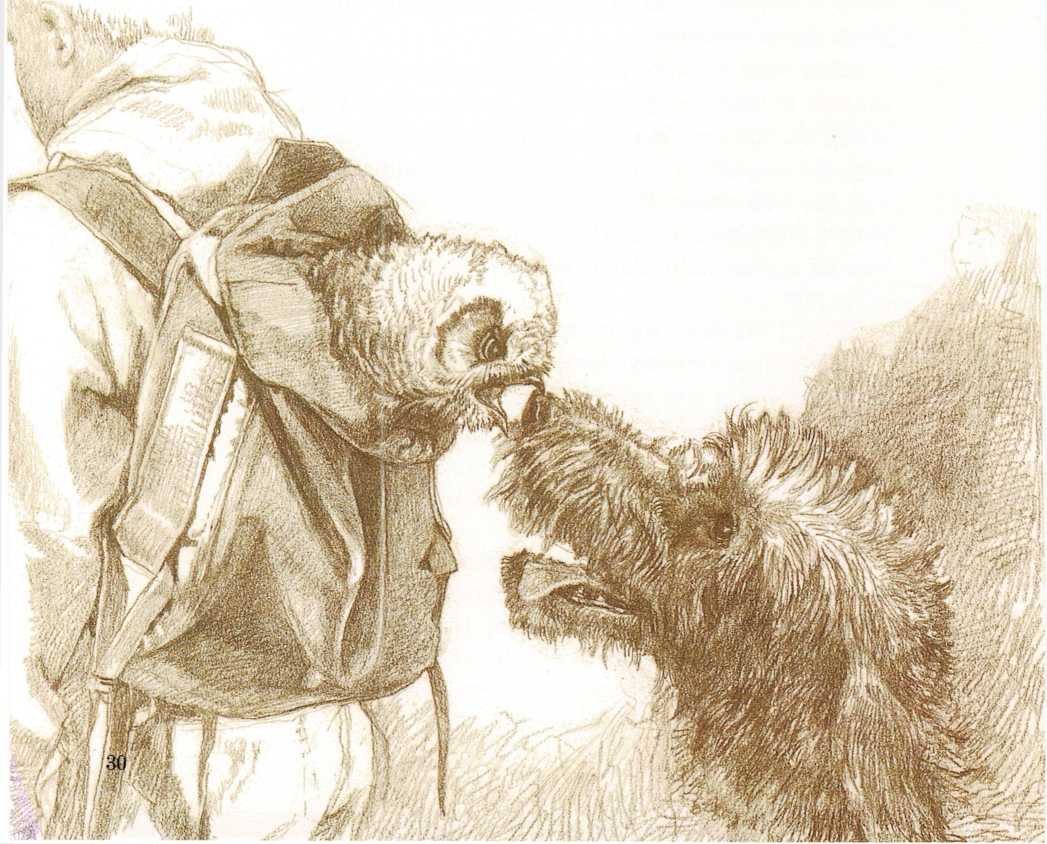
close to an owl before. But he knew he smelled something strange. I
stood there trying not to laugh while he sniffed all around me. He
snuffed my trousers and then he began to sniff the haversack. When his
nose was nearly in the owl’s face, the bird opened its beak and snapped
it shut again right on the end of poor old Mutt’s black nose. Mutt gave
a yelp you could have heard a mile away, and went loping off to hide his
hurt feelings under the garage.
We put the owl in the summerhouse and when Dad got home from work the
owl was sitting on an orange crate watching the gophers running around
on the floor below him. It kept him busy. His head kept turning one way
and then the other until it looked as if he were going to unscrew it
right off his shoulders. He didn’t know what to make of the gophers,
because he had never seen a live one before. But he was certainly
interested in them.
“Better count your gophers, Billy,” said my father. “I have an idea they
may start disappearing. By the way, what do you call your owl?”
I hadn’t thought of any name for him up until that moment, but now one
just popped into my head. I remembered Christopher Robin’s owl in
Winnie-the-Pooh.
“His name is Wol,” I said.
And Wol he was, forever after.
3YE
If one owl is a good pet, are two owls better? You can read about
Billy’s many funny adventures with his owls in Owls in the Family. The
author, Farley Mowat (who is the Billy in this story) is one of Canada’s
finest writers for young people. Another of his books that you’ll like
is The Dog Who Wouldn’t Be, which is about the Mutt in this story. And
to find out how owls live in the wild, try Bubo, The Great Horned Owl
by John George and Jean Craighead George.

